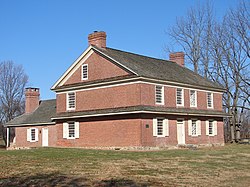Primitive Hall
|
Primitive Hall
|
|
 |
|
| Nearest city | Kennett Square, Pennsylvania |
|---|---|
| Coordinates | 39°52′33″N 75°50′2″W / 39.87583°N 75.83389°WCoordinates: 39°52′33″N 75°50′2″W / 39.87583°N 75.83389°W |
| Area | 5 acres (2.0 ha) |
| Built | 1738 |
| Architectural style | Georgian |
| NRHP Reference # | |
| Added to NRHP | March 19, 1975 |
 |
|
|
|
Primitive Hall is a brick house built in 1738 in rural Chester County, Pennsylvania, United States, by Joseph Pennock. The house was occupied by his descendants until 1960, when it was donated to and restored by a foundation controlled by his descendants. The house was listed by the National Register of Historic Places in 1975.
Joseph Pennock (1677–1771) made a mysterious note in his Bible concordance dated September 14, 1738, "then my impostum brok and the Seme year I Bilt my nu Hous" which is taken to mean that Primitive Hall was built in 1738. He was born near Clonmel, Tipperary County, Ireland, and acquired the land in 1703 as a result of a 1683 purchase of 5,000 acres from William Penn by his grandfather, George Collet. Of the original 1,250 acres in West Marlborough Township conveyed by the purchase, Pennock kept 700 acres throughout his lifetime and gave the rest to one of his sons. He was a merchant in Philadelphia and used Primitive Hall as a country estate. Though he was a Quaker all or most of his life, one source reports that he was not a member of the Society of Friends at the time of his marriage.
Joseph married Mary Levis in 1705 and moved to West Marlborough Township by 1714. Mary bore 12 children and died in 1748. The foundations of a circa 1710 house are nearby. The family presumably lived in this house before moving into their new house, Primitive Hall, by 1740. During the early 1700s West Marlborough Township was on the frontier and Joseph reportedly left food out for Native Americans who would drop in and sleep in the central hall.
Joseph was a member of the Pennsylvania Assembly from 1716 to 1744 and was also a Justice of the peace, performing his judicial duties in the old Chester Courthouse. Iron bars in one of the cellar windows suggest that the cellar was used as a jail until the accused were transported to Chester. Joseph's son, Nathaniel, also served in the Pennsylvania Assembly, until his resignation in 1756 at the start of the French and Indian War, on the basis that a Quaker should not be a part of a government that was in a state of war.
...
Wikipedia


